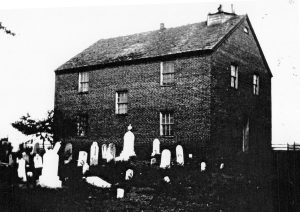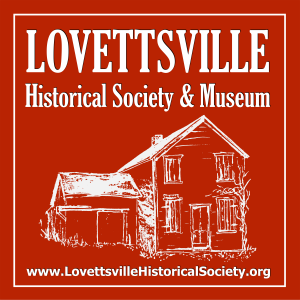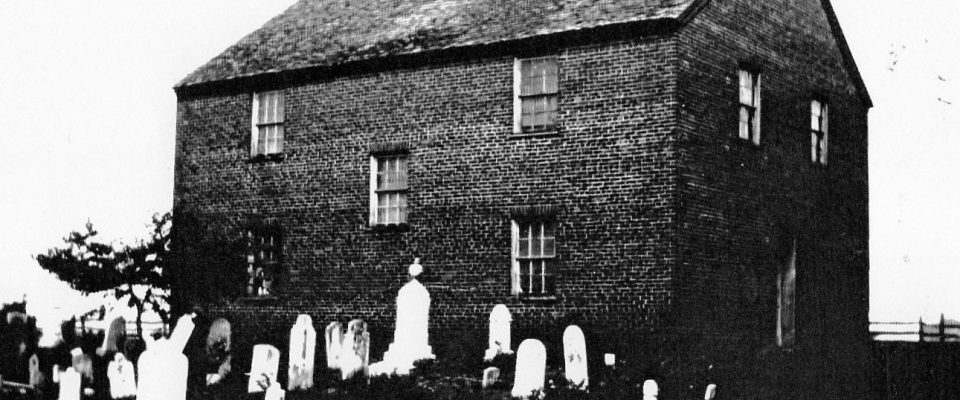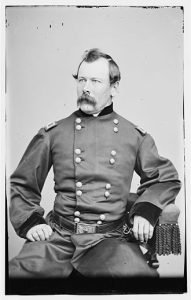March 1865 — Aftermath of the Union Encampment. A message from the “Vine Clad Cottage”
By Edward Spannaus
In January and February 1865, Lovettsville was the site of large winter encampment for part of General Phil Sheridan’s Union Cavalry. 2,500 Union cavalrymen of Gen. Thomas Devin’s Brigade of the First Cavalry Division, Army of the Potomac, began arriving in the Lovettsville area on January 1, 1865, to set up winter quarters. Consisting of six cavalry regiments – the 4th, 6th, and 9th New York, the 17th and 20th Pennsylvania, and the 1st New York Dragoons – the camp almost encircled the small town of Lovettsville, stretching from Armistead Filler’s farm (Linden Hall) on the Berlin Turnpike, east and south of town, and then back up to George’s Mill on the west side. The troops constructed log houses along a wide central avenue. General Sheridan inspected the camp on January 14, 1865.
During the encampment, the Presbyterian Church on South Church Street[i], was used as a Federal hospital. The New York Times described it as “one of the most comfortable and best regulated hospitals ever seen in the field.” Besides the brick church, the Times noted, a number of “cozy logs huts” were built for use as hospital wards, which “are more comfortable in fact, than ordinary frame houses would be in this inclement weather.”[ii] Among the physicians treating the sick and wounded at the hospital was Army surgeon Dr. James Williard, who later returned to Lovettsville and set up a medical practice here.

Lt. Col. Elijah White of the 35th Battalion, Virginia Cavalry, (the “Commanches”) led the only significant Confederate attack on the Federal camp, at George’s Schoolhouse, on the night of February 17-18, 1865. After an initial success, White’s troops were forced to retreat, with only a few casualties on each side.
After the Schoolhouse Raid, there seems to have been an informal truce between Union and Confederate troops, as there were no more conflicts. Local Confederate and Union soldiers were generally able to visit their homes without incident during this time, and local citizens were left alone.
All this changed with the end of the encampment in late February. Soon after Devin’s brigade broke camp and left Lovettsville, Col. John Mosby returned to northern Loudoun County with elements of his 43rd Battalion, Virginia Cavalry, seizing provisions from the now-unprotected local farmers. As Between Reb and Yank[iii] reports it, Mosby’s rangers began what he called the “collection of the tithe” in Waterford on March 6, seizing horses, and then corn from Thomas Phillip’s farm. The troops fanned out around the countryside and towards Lovettsville, looking for provisions and horses with which to haul the loot.
This is the situation described–with growing alarm– in the following letter written from the “Vine Clad Cottage” on March 8. Apparently written to Dr. Henshaw from a woman friend identified only as “A.C.S.”, the author tells how friends and neighbors are faring, in the aftermath of the removal of Col. Devin’s troops. The letter was transcribed by Michael Zapf and has been slightly edited for readability.
[i] The old Presbyterian Church was built in the 1830s and demolished in the 1930s. A smaller church was built on the site in the 1970s, and it is now the site of the Willows Vintage Charm gift shop.
[ii] E.A. Paul, “From Sheridan’s Army.; A False Rumor, A Scout in Trouble, How a Brave Soldier Acts, Casualties—Lovettsville Hospital,” New York Times, Feb. 12, 1865.
[iii] Taylor Chamberlin and John Souders, Between Reb and Yank: A Civil War History of Northern Loudoun County, Virginia (2011), Chapter 34, “Federal Camp at Lovettsville,” and Chapter 35, “Final Campaigns.”
Vine Clad Cottage
March 8th, 1865
Dear Friend,
Situated and surrounded by the slanting rays of an afternoon sun & plenty of Rebs is your friend engaged in writing to you. I hope if my letter proves uninteresting you will pardon me for all I say for I feel in the humor today some hard things after being surrounded by Gen. Devins troops all winter in peace and quietness & now among those midnight robbers in the shape of human beings is enough to try the patience of the Saints. Last Thursday night at twelve o’clock we were aroused by those marauders & the house searched from corner to corner, they said looking for Sutler goods & Arms — a bright idea they also went to the River searched Bro Sauder[i] took all his sugar & Coffee, Pepper, Soda & many other things in that line together with some of his clothes & his wife’s. Robt [?] was there at the time got his gloves. They took nothing from us but a gun & some spuds.
They have plundered Mr. Hilleary’s house[ii] five times, treated them badly, as I have told you before. They have taken all the oats, now they are taking some corn & meat Monday they took from Mr. Phillips, and about Waterford today reports say they are conscripting.[iii] They caught several yesterday. Last night there was a party at James Killgours,[iv] a Soldiers party of course. It is hard stand after being so nicely fixed with our Yankees enough to break our hearts. Some can hardly stand the attack. I am packing mine up, hardly think can survive another attack like this, shut off again from all that is near & dear to us in the mercy of the enemy are. I need not say mercy for they have none.
Last Sunday they went to old Mrs. Wenners, her sons were not at home. They took her horses & she followed until one o’clock Sunday night as far as Purcellville where they give up her horses. I think that was as inhuman act as one could be guilty of for an old lady. But as sure as there is a just God in heaven such crimes will not go unpunished. I don’t [think] there can be any redemption for such vile wretches. If there is any thing on earth I do hate, it is a Rebel in any shape. The more hopeless their cause gets the more desperate are they. Our neighbours could not be seen while the Yanks stayed but now they think they have their independence. Miss Liz has revived but looks like hard times & poor. Mrs. Wright looks disconsolate & broken hearted , no one to sympathize with her in her troubles unless you will. I am so hard down on Rebs that I would not say one word if it would or could turn their sorrow to joy. I would not speak. I know I should have a forgiving heart & think I have, but I feel as there will never be forgiveness for them. The Leslies[v] justly deserve imprisonment for life. His sons & Frank Curry[vi] & Flave Dowdell[vii] [and] Mr Jacobs are engaged in plundering the horses. Dowdell is going to move near Bloomfield. I would not care to see them all moved off the face of the earth, but I will try to entertain better feelings.
We are almost afraid to close our eyes to sleep at night. Father, you may know, feels badly if he could get or hear of a situation any where away from here, he would leave, for we feel as if it would not be safe here if it remains this way here long. But, the good work is going on in other parts if not with us, when we view every thing we feel like enduring many hardships for that which will prove our lasting happiness. When I think of the many fire sides once happy & contented is now desolate, how many a heart once cheerful & gay is now bleeding, aching and dead, & Old Virginia must be only a ruin of what she once was. I have been reading in the papers of the barbarous treatment of our Union Soldiers in Richmond, it makes my heart ache. I hope you may never realize the Southern chivalry which is now no more, no less than wholesale murder. I visited the Hospital in Lovettsville & contributed all we could to their comfort & wants which was thankfully received & was also a source of pleasure to me to do what I could for the Loyal, true & brave that have sacrificed their lives for our country. There was thirty or forty sick & a few wounded. Your friend Coopers are very sorry you did not get over this winter. They are very anxious to see you & to hear from you. Mr. C. is afraid to write to you for fear his letter may be captured by the Rebs. But we go together hoping for something good all the time.
Before closing I must tell you on Nerva. When the Rebs came to search she set down on a box she had and drove two of them away, told them they should not see in her things. One asked her kindly & [she] let him look, told (that) he was gentleman. They call often for something to eat, I do not think there are more than two hundred in all in our county at this time. There may be more more, hard telling. Write soon, give us all the news you have. Father says tell him if your doing anything for Loudoun. Ella says she would like to see you to tell you the jokes on us all. Nerva & all send their respect to you
As ever yours, A.C.S.[viii]
Write soon
J.J. Hensaw, since I closed we hear they have taken some corn from Uncle J. Wolford & are__[illegible] Charlie keeps hid. The men are all frightened to death it is laughable to hear the complaints. Mr. Hilleary in bed sick. I believe I told all I know this time.
A.C.S
[i] John B. Souder was a Hoysville farmer and was a delegate to the 1859 Virginia Democratic Convention. (Between Reb and Yank, p. 20). He was arrested by Union troops in fall of 1861 and taken to MD, but was released after taking the loyalty oath (BRY, p. 64).
[ii] William Hilleary was a Lovettsville tinsmith, and his wife operated a millinery shop.
[iii] On March 8, 1865, a Lt. Scott arrived in Waterford with a ten-man conscription detail. The team only got two conscripts. “That only two youths from Waterford were taken shows that the community knew how to shield its sons.” (BRY, pp. 324-325.) In Lovettsville, 16-year-old Elijah Goodhart and some friends hid in what was left of the balcony of the Presbyterian Church, which had been used as a Union field hospital. (Ibid.)
[iv] James Kilgour was the first signer and likely author of a petition by neighbors of Hillsboro’s James C. Janney, asking Col. Mosby to return two horses taken from Janney in April 1864. (BRY, p. 243, 375 n46.)
[v] Col. (of militia) John V. Leslie owned a large farm near Morrisonville, and reportedly informed on Unionists to Col. White; but in a Southern Claims proceeding, he claimed to be loyal to the Union, and many Unionists testified in his favor. He said his sons Benjamin and Thomas joined the rebel army against his wishes. (BRY, P. 252). Benjamin Leslie was killed April 6, 1865, at Battle of High Bridge near Farmville (BRY, p. 333).
[vi] Frank Curry, a member of White’s Cavalry, was with John Mobberly in the advance party for White’s Jan 17, 1865 “George’s Schoolhouse raid” on the Federal encampment; they were wearing blue coats to deceive the Union pickets and killed two pickets. (BRY, p. 312.)
[vii] William Flavius Dowdell, from Lovettsville, enlisted in early 1861 in Paxson’s Troop of cavalry, which was formed in 1860 as part of the 56th Regiment of Militia to patrol along Loudoun’s northern border, the Potomac River. Paxton’s cavalry, a mixture of secessionists and Unionists, was dissolved in April 1861. By the summer of 1863, Dowdell was a Captain in Elijah White’s 35th Battalion of Virginia Cavalry, known as the “Commanches.” (BRY, PP. 24, 197, 206, 287.)
[viii] “A.C.S.” is possibly Annie C. Scott – a loyalist, who signed a petition to Secretary of War Edwin Stanton on 6 February 1864, asking for the ability of loyal Unionists to get goods and trade across the Potomac. In the 1870 census, she is listed as being 33 years old, born in 1837, and living with her parents. She had a younger sister named Minerva, who could be the “Nerva” cited in the letter. She died single, on 17 January 1886, and was buried at Rehobeth Methodist Church, which is located south of Lovettsville, and where (“Uncle”) John Wolford also buried.


